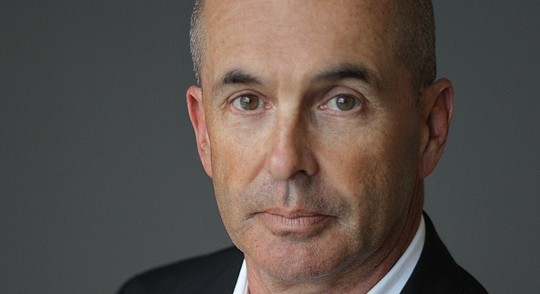
The Cartel picks up where The Power of the Dog left off, and follows its two main characters, Art Keller, a DEA agent, and Adan Barrera, a Mexican drug lord, through the most recent 10 years of the War on Drugs. Barrera gets out of prison and decides to rebuild his empire, which brings Keller out of retirement to try to bring him down in a decades-old blood feud. The story follows mostly true events, and other characters include a 13-year-old hitman, a Texas high school football star who becomes the first American cartel leader, a journalist trying to cover the story under threats, and a beautiful social activist that Keller falls in love with. It’s a huge story, set in Mexico, the US and Europe, and tells, in a fictional sense, what’s happened in the drug wars and how we got there.
When you finished The Power of the Dog, did you plan a sequel?
I had no intention of writing a sequel or ever returning to the subject again. Dog took me over five years to write and research, and it also took a lot out of me. At the time, I thought I had written about the worst of the worst, but the most tragic incidents in Dog would hardly have made the news in, say, 2010. I didn’t want anything to do with it. But sitting near the border, and watching these events unfold, I had to ask myself what was happening. Why was it happening? What had changed to cause such a spiral of violence? I started doing research without really admitting to myself that I was doing it for a potential book. I just wanted to know what was going on. I started putting together a chronology that eventually ran to 157 single-spaced pages. When I looked at that, I began to see patterns, explanations behind the headlines. I thought I saw a story. One morning I found myself typing it.
Well, because of Dog, I already had a background in the history of the cartels and the War on Drugs, so I didn’t have to reinvent that research wheel. Also, I had already made contacts and connections, some of whom were still available. Having said that, the subject in The Cartel was just so much bigger, more complicated, more moving parts. It was a bigger political story, cartel alliances were shifting all the time, the US strategy on combatting drugs was constantly evolving. The whole scene was just so different. So it took a lot of new research. The writing also took time because of the sheer size of the story and the challenge of organising it in to something coherent. I used the Keller-Barrera conflict as the spine, and then started to look at significant events in real life, which was like putting on muscle and bone. Then I had to decide which character’s experience was the best to view a particular incident. That was a lot of trial and error, which is time consuming.
Having been critical of the war on drugs previously, did this affect your ability to get access to those whose job it is to prosecute that war?
In some cases. Some people I talked to for Cartel wanted to know who I talked to for Dog. I keep those things pretty close to the chest. The bigger truth is that most people want to tell their story, they want to be understood, they want to give their point of view. I think that a lot of the people who are out there prosecuting – in all senses of the word – this war feel pretty frustrated, whether they’ll come out in public and say so or not. A number of them have retired and then come out and said it. You have a whole organisation now – LEAP, Law Enforcement Against Prosecution – saying that we should legalise. So I think that a lot of people in the field know what the truth is, and their personal feelings about it are pretty complicated.
My friend and writing partner Shane Salerno and I plan to put out feature films of first Dog, followed by The Cartel. The screenwriting process in the first is ongoing, and the script I have seen of Shane’s is the best script I have ever read. Stay tuned.
You followed The Power of the Dog with the more light-hearted The Winter of Frankie Machine. Did you feel a need to decompress after writing such an emotionally intense book?
I absolutely did. After Dog, Frankie had an almost nostalgic feeling about it, writing about an old-school guy who, although he was a hitman, had some standards. In Frankie’s day, no one hurt families, wives or kids. It was also a break to write about one main character with one plot line, and fun to set it in San Diego so I got to drive around and do ‘research’. After Cartel, I won’t hit the drug topic again, at least not for a while. It’s not so much a matter of taking a break from it, it’s just that there are other subjects I want to tackle and learn about it. The problem with this life is not that there aren’t enough things to write about, it’s that there are too many. Sometimes I’ll see a story in the newspaper, or something in the past that strikes me. Other times it’s a character that starts coming to mind, and then I ask myself , ‘Okay, what about him?’ Deciding which comes first is always a problem. Sometimes, I’ll start writing a couple of books at the same time, and see which one wants to take off and fly.
Ben Tompkins, lawyer for the Barrera cartel, is nick-named Minimum Ben. His legal opposite the federal prosecutor longs to be called Maximum Bob. Have you sneaked in a little tribute to Elmore Leonard?
That was definitely an homage to the late, great Mr Leonard who, yes, was a major influence on me. I was reading Elmore Leonard when I was still a PI, doing stakeouts. I think that Unknown Man #89 is one reason I’m a writer. He did everything with such style and grace, and made it look easy. I had a chance to speak with him on the phone not too long before his passing, and it was one of the great thrills of my life. He told us Hollywood stories for an hour, and he couldn’t have been more gracious, generous and kind. I miss him.
Finally, can you give our readers an idea of what to expect next from you?
I don’t think I’m ready to come out with that publicly yet. I’m working on a couple of things that I’m very excited about, neither of which have anything to do with drugs. I will tell you that I don’t think that I’ve written my best book yet.
Watch for our review of The Cartel soon here on Crime Fiction Lover.
